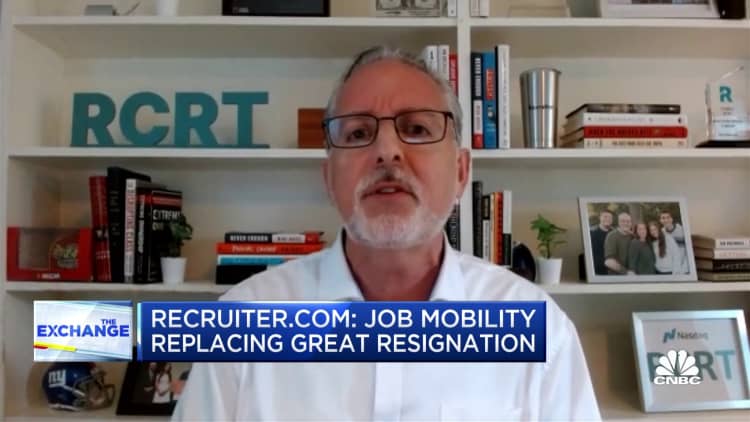Pay transparency laws — which require employers to disclose salary ranges — have several benefits, including pay equity and more successful negotiations during the hiring process.
But that could lead to more dissatisfaction and resignations as employees “discover inequalities among themselves,” according to talent analytics firm Visier.
wage compression It explained that this happens when salaries of permanent employees do not keep pace with the market – while new hires are paid at market rates.
Andrea Derler, head of research and value at Visier, told CNBC Make It that while wage compression is nothing new, it will become more widely known as open wage conversations become more common.

She added: “Wage compression has always been a reality, but is sometimes hidden from employees because of a lack of visibility into what their peers are paid – pay transparency is changing that.”
Pay adjustments slow resignations
Visier’s “New Facts About Compensation” report It found failure to identify and quickly address the impact of wage compression on teams could lead to “more and faster resignations”.
Its findings are drawn from its database of more than 18 million employee records in 75 countries.
According to a November 2022 survey by ResumeBuilder.com, approximately 1 in 20 U.S. workers will quit If they find themselves earning less than their colleagues.
To address this, companies should implement “compensation adjustments,” which are distinct from yearly salary changes — and are often larger, company-wide efforts, Dele said.
Any form of recognition, growth opportunities, or appreciation can have a similar effect, but…salary adjustments are an effective way to retain existing team members after hiring highly paid team members.
“The percentage increase in an employee’s salary is determined by considering various inputs, such as whether the company is meeting its annual financial goals, and the employee’s individual or team performance,” Derler said.
However, she added that pay adjustments were targeted at individuals at the local team level to address “the risk of worker exit”.
Visier found that employees who didn’t have a salary adjustment within six months to account for the latest high-paid team member resigned 1.8 times sooner than those who received an adjustment within the first month.

In addition, Visier said, employees who were not adjusted within 12 months resigned 2.3 times sooner.
“[This]shows that it’s important to reassure employees that they are still valued at the company despite new entrants,” Derler said.
“Any form of recognition, opportunity for growth or appreciation can have a similar effect, but … compensation adjustments are an effective way to retain existing team members after hiring highly paid team members.”
why dissatisfaction
There can be many factors behind wage differences: skills, education, experience, previous wages and negotiation skills, Visier said.
Nonetheless, it added that it was still important for companies to consider adjustments for employees who have been with the company for longer periods of time.
(New hires) still lack in-house role experience, and the overall institutional knowledge that others have. They come in at a higher level or salary…still brings a potential threat and competitive element.
“We’ve all been there: when a new team member enters the team, it affects existing team members, simply because jobs and responsibilities are shuffled and training and onboarding are to some extent support from those who have been in their jobs longer,” Deller said.
Even if new entrants are more senior and therefore better paid, it can cause existing employees to question their position and pay, she added.
“[It]could also crush promotion hopes for existing team members who have been in the role longer – leading to questions like ‘they came in at a higher level than me, why didn’t I get promoted?'”

That’s why employees whose salaries stay the same for long periods of time have higher quit rates after new, higher-paid team members enter the team, Derler said.
“(New hires) still lack the in-house work experience, the overall institutional knowledge that others have. Their entry into higher ranks or salaries … still presents a potential threat and element of competition.”
what can you do
It’s understandable that you might be “disappointed” when you find out that you’re making a pay gap compared to your peers, Dele said.
“But try not to assume your employer is malicious. It could be a simple oversight, or your organization lacks information about the difference in wages between you and your colleagues.”
Derler offers three pieces of advice for those who decide to ask their employers to adjust their wages:
1. Measure your salary externally
Understand the value of your role’s work within your company and other similar organizations. Gather external market value information about your role and desired experience through platforms such as Glassdoor and LinkedIn.
2. Prove your value to the company
List how your work over the past year has added value to the success of your organization, your team, and your manager. Instead of listing what you did, show how what you did had a positive impact.
3. Negotiate amicably with your employer
Based on the information you gathered in the previous steps, come up with a range of percentage increases that you’re comfortable with. State it clearly and firmly — and back it up with a list of your accomplishments.



